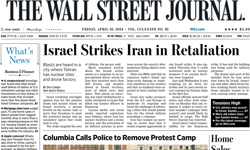When my consultancy was taking me to exotic locations such as Kerala in India and Dubai, there was also a period during this time when my efforts and media advice were focused on counties in the Caucasus Region of Eurasia. Working through the Organisation for Security and Co-operation in Europe (OSCE), my objective was to look at regional and national newspapers in Georgia, Azerbaijan and Armenia. Georgia, like many post communist countries, suffered from the economic crisis following the Rose Revolution in 1991 and has remained in a downturn ever since. In the usual American ‘cut-to-the-chase’ terms, my clients wanted me to advise media owners and editors on how to survive their current financial downturn dilemma. This was four years ago and, at the time, I never envisaged that the same market forces would be evident in the UK in 2009.
So, based on my experiences in the Caucasus, I would like to suggest a few tactics for dealing with a negative market:
1. The business fitness check
This is basic business school stuff, but I try to get publishers to produce a one-page spreadsheet showing their business in a snapshot. This is a great discipline and can be done through some off-the-shelf Excel enhancement programs such as ProClarity, which manages hundreds of spreadsheets and produces a dashboard management tool. For example, have you got an idea of what an average page actually costs in your publication? If not, you should.
2. Talk to your accountant
Have your accounts team been a support recently or are they treading the same well-worn path? Do your accounts staff merely do what you tell them to, or are they proactive in making the best of the financial aspect of your business? Expect “added value”. A stronger focus by them on credit control is paramount. A strong proactive accountant with a clear directive who understands your business vision will bring a fresh approach to costs and your needs.
3. Staffing issues
This will always be a tricky subject and many of you will not have legions of employees. The days of 7,000 staff (News international in the 80s) are long gone. A professional staffing review carried out by an outsider will always pay for itself. Rather than being an unnecessary additional cost, this will bring a fresh view of your most precious resource, perhaps with surprising results. I managed such an assessment with Axel Springer in Germany in the 1990s, and the staffing appraisal and review process recommended that over 20% of the staff were either in the wrong position for their alpha skill profile, or indeed, were not of the required standard if the position were to be freshly advertised.
So what can you do? It’s true to say that during a downturn, training programmes are one of the first things to be struck off the budget. Apart from making your staff aware that the survival of your product is a company-wide responsibility, you must impress that a fresh approach to such a responsibility will enable the firm to approach the future with confidence. On a positive note, where training is imperative, costs are always negotiable and it is always worth talking to several companies, especially in these straightened times. You could also combine, through your local ‘product network’, groups of staff from different areas or companies, to reduce overall costs via volume bookings.
4. Print costs
I would expect you to negotiate your printing costs on a regular basis, but if this has not been done for some time, now is a very good time to talk! You may face reluctance initially, but some business from you is better than none!!
Look locally at your wholesale / distributor deal. Although major changes to the UK wholesale network have reduced choice, it is in the wholesaler’s interest to keep your publication going.
If you are experiencing some cash-flow problems, talk to them about a longer term deal. Look at alternative distribution.
5. Subscription sales
This publication is full of great advice. All I can say is take a fresh look at pushing these. We all know about the additional profit, but the money up-front will help financial planning.
6. The joint effort
This tactic is probably the most alien concept of all. Years of insularity make it difficult to think about co-operation, especially regarding regional titles. Talk to non-competitive businesses and be seen to be active in your region. Local newspapers, unlike politicians, still command a lot of respect, and you have a ready platform that other local businesses would welcome interaction with.
Hold a local employment / enterprise forum. People feel good about meeting others in the same position and networking with similar or complementary businesses. Instead of just reporting economic and local downturn news talk about what you are doing - be positive!! This particular piece of advice was turned into a major revenue stream for a publisher in Georgia.
7. Stay Active!!
I see so many media businesses go down due to a lack of action. They think that having to ‘tighten their belts’ means ‘be about as boring as a cheap accountant’s suit and tie’. That does not impress anyone nowadays and watching the bottom line is not always the only solution. Action does not always equate to an increase in spending!! Action through motivating or creating an interested audience is what is required. Fresh marketing advice can be a low cost option with big rewards.
8. Talk to your competitors
This is closely related to the “joint effort” (see point 6 above). I know it is frowned upon in this country, but as the situation in the marketplace tightens, my advice is to talk and look at common efficiencies. In the past, the Office of Fair Trading has had issues with collaboration, but is it not worth talking and trading rather than being ‘fair’ but with no business? My view is that as long as price setting is not involved, joint initiatives are one way to survive the storm. Create a local supply-chain forum so that efficiencies in getting to the market can be discussed. With the under-utilisation of transport in today’s climate, there are numerous opportunities for progressive rationalisation. Keep the competition at the point of sale and not in the delivery.
9. Waste Waste Waste
The time has come for the industry to grow up and stop treating newsprint as a way to bring in extra sales. Clever management of waste will bring in much needed cost reductions. Well spent effort in this area every week will bring dividends in cost savings and allocation of sales. I know a lot of you leave this area to your distributor, but how well are they doing the job? It may be time to take it back in-house for the immediate future where you have real control.
10. Magazine focus
Look local and satisfy the needs of your local audience. Tell them, loud and clear, what is on offer, with whatever bright lights you have to hand! Consumer choice has changed and we now expect pertinent information focused on our interests to advertise what is on offer. Magazines need to tempt with next edition blurbs, not easy with the standard lead times involved but still no excuse. Always remember you are talking to your core readership, so keep them keen and looking forward to the next edition.
11. Tap into user talent
Keep the focus on your market via local / pertinent exhibitions etc. A problem with some of the major magazine publishers is that the marketing / circulation handlers frequently cover numerous special interest magazines. With such a wide spread, a detailed knowledge of the subject is not always possible. Make use of the technology available and use internet forums, an established interest group or club, recruit a champion to keep you abreast of changes and new innovations, and of course they may come up with novel or refreshing ideas for selling more magazines.
12. Batten down or venture out? The era of co-operation.
How to best ride out this downturn? My advice via the OSCE was not to panic. Do not just be inward looking for efficiencies, but open your eyes and embrace the challenge of working with other companies in a new era of co-operation. If it worked in Azerbaijan, it just may work here.










